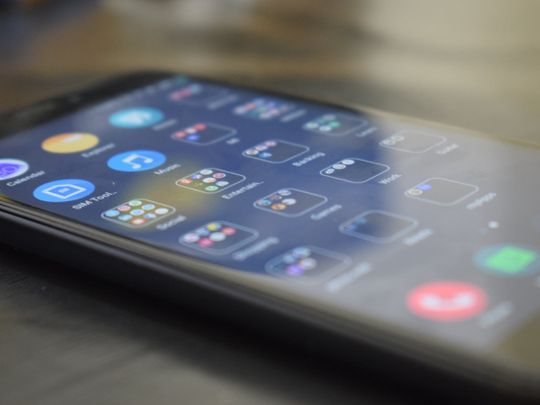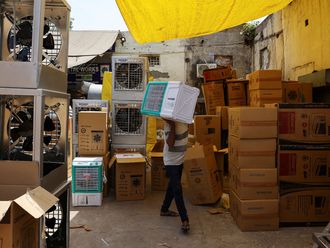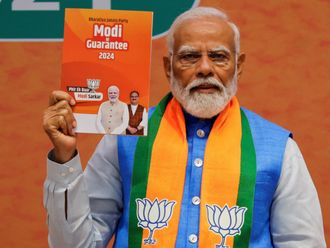
New Delhi: Amid reports of snooping of prominent citizens, the Indian government said that allegations of surveillance on specific people have no concrete basis or truth associated with it whatsoever. On Sunday, several news reports claimed that a data leak investigation revealed that a spying software, called Pegasus, was used for surveillance of prominent citizens including government officials and journalists.
In response to journalists' queries on snooping of prominent citizens, Additional Secretary, Electronics and Information Technology, Rajender Kumar said: "India is a robust democracy that is committed to ensuring the right to privacy to all its citizens as a fundamental right. In furtherance of this commitment, it has also introduced the Personal Data Protection Bill, 2019, and the Information Technology (Intermediary Guidelines and Digital Media Ethics Code) Rules, 2021, to protect the personal data of individuals and to empower users of social media platforms."
What are the reports?
The alleged use of the software, called Pegasus, was reported on by the Washington Post, the Guardian, Le Monde, and other news outlets who collaborated on an investigation into a data leak. The reports claimed that 50,000 numbers were identified as potential targets of the surveillance.
Not all of those numbers were subsequently hacked, and the news outlets with acccess to the reported leak said more details about those who were compromised would be released in the coming days.
The Pegasus snoop list allegedly has 40 Indian journalists, and a news report by The Wire claimed that the forensic tests confirmed the presence of Pegasus spyware on some devices.
The presence of a phone number in the data does alone not reveal whether a device was infected with Pegasus or subject to an attempted hack. However, the Pegasus Project, a consortium of international news organisations, believes the data is indicative of potential targets identified in advance of possible surveillance attempts.
Those on the leaked list of potential targets from India include journalists at Hindustan Times, The Hindu, The Wire, Indian Express, News18, India Today, Pioneer, besides freelancers, columnists, and regional media.
The attack can begin in different ways. It can come from a malicious link in an SMS text message or an iMessage. In some cases, a user must click on the link to start the infection. In recent years, spyware companies have developed what they call "zero-click" attacks, which deliver spyware simply by sending a message to a user's phone that produces no notification. Users do not even need to touch their phones for infections to begin.
Indian government response
"Government of India's response to a Right to Information application about the use of Pegasus has been prominently reported by the media and is in itself sufficient to counter any malicious claims about the alleged association between the Government of India and Pegasus," Kumar added.
"The commitment to free speech as a fundamental right is the cornerstone of India's democratic system. We have always strived to attain an informed citizenry with an emphasis on a culture of open dialogue."
He stated that the questionnaire sent to the Government of India indicates that "the story being crafted is one that is not only bereft of facts but also founded in preconceived conclusions".
"It seems you are trying to play the role of an investigator, prosecutor as well as jury," he wrote.
He pointed out that answers to the queries posed have already been in public domain for a long time, and it also indicates poorly conducted research and lack of due diligence by the media organisations involved.
He held that in India there is a well-established procedure through which lawful interception of electronic communication is carried out in order for the purpose of national security, particularly on the occurrence of any public emergency or in the interest of public safety, by agencies at the Centre and states.
"The requests for these lawful interception of electronic communication are made as per relevant rules under the provisions of Section 5(2) of Indian Telegraph Act ,1885 and Section 69 of the Information Technology (Amendment) Act, 2000," the official said.
He mentioned that India's Minister of Electronics & IT has also spoken in detail, including in the Parliament, that there has been no unauthorised interception by Government agencies.
"It is important to note that government agencies have a well-established protocol for interception, which includes sanction and supervision from highly ranked officials in Central and state governments, for clear stated reasons only in national interest. The allegations regarding government surveillance on specific people has no concrete basis or truth associated with it whatsoever," he said.
He further mentioned that in the past, similar claims were made regarding the use of Pegasus on WhatsApp by the Indian state and those reports also had no factual basis and were categorically denied by all parties, including WhatsApp in the Indian Supreme Court.












